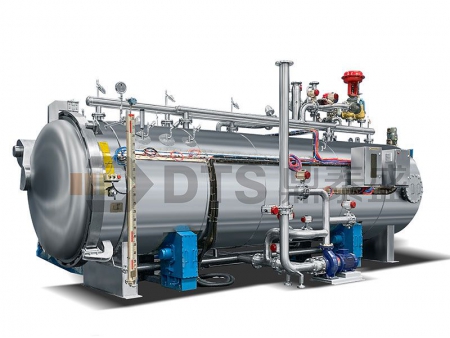Steam Rotary Retort
Steam Rotary Retort
Steam rotary retort uses the rotating motion to accelerate the heat transfer rates of the products inside the package. During the sterilization, the air is evacuated from the retort by flooding the vessel with steam, exhausting air through the vent valve. There is no overpressure during the sterilization phases, because air is not permitted to enter the vessel at any time during the sterilization step. But there may be air overpressure applied during the cooling steps to prevent the container deformation.
- Package type: tin cans
- Food type: beverages (protein powder, tea, coffee), milk, fruits and vegetables (mushroom, beans), baby food, ready meals and soups, pet foods
- Uniform temperature distribution
- In steam retort, the air is exhausted from the vessel and saturated steam is applied for sterilization. Therefore, the temperature inside the vessel is uniform in the end of come-up vent phase.
- Simple and reliable
- Compared with other sterilization methods, steam sterilization process uses steam as the only heating media during the heating and sterilization processes. So the only thing that needs to be managed is the steam to keep the batch of products consistent.
FDA has made a detailed explanation of the design and operation of the sterilizing retort, so customers are clear of the working principle of this type of sterilizer, which also makes it highly accepted by our old users.
- Rotary system has simple structure and stable performance
- The rotating body structure is molded through one-pass process, and then undergoes balanced treatment to ensure the concentricity and stability during rotating.
The supporting roller system comes with simple structure, delivering easy maintenance and prolonged service life.
The clamping system adopts double-way cylinders, and the guide structure is stressed to prolong the service life of the cylinder.
- In compliance with FDA/USDA certificate
- Backed by its team of seasoned thermal processing specialists, DTS has become a member of IFTPS and works in full cooperation with FDA-recognized third-party accreditation bodies. Years of experience in working with many North American customers means we understand the regulatory requirements of FDA/USDA and state-of-the-art sterilization technology.
| Model | Diameter (mm) | Cylinder Length (mm) | Volumn (m³) | Overall Length (mm) | Overall Width (mm) | Overall Height (mm) | Basket Size (L×W×H/mm) | Designed Temperature (℃) | Tested Pressure (Mpa) | Designed Pressure (Mpa) |
| | 1400 | 2500 | 4.16 | 4100 | 2450 | 2500 | 938×938×760 | 147 | 0.44 | 0.35 |
| | 1400 | 3500 | 5.70 | 5100 | 2450 | 2500 | 938×938×760 | |||
| | 1400 | 4500 | 7.23 | 6100 | 2450 | 2500 | 938×938×760 | |||
| | 1600 | 3600 | 7.69 | 5300 | 2900 | 3100 | 1000×1000×946 | |||
| | 1600 | 4700 | 9.90 | 6400 | 2900 | 3100 | 1000×1000×946 | |||
| | 1600 | 5750 | 12.01 | 7450 | 2900 | 3100 | 1000×1000×946 | |||
| | 1800 | customized | \ | \ | 3100 | 3500 | \ | |||
| | 1800 | customized | \ | \ | 3100 | 3500 | \ | |||
| | 1800 | customized | \ | \ | 3100 | 3500 | \ |
First, send the product into the sterilization retort in a basket, with every cylinder pressurized separately. Then close the door, which is secured by a triple safety interlock. The whole sterilization process is then automated and controlled by PLC.
Then, the retort is heated by injecting hot water from a tank and removing cold air from inside. Steam is simultaneously injected at the top to fill the retort with steam. This process continues until all the hot water is removed and the temperature reaches the sterilization point. Notably, there are no cold spots during the heating and sterilization process.
Once sterilization time is reached, cooling water is introduced to begin the cooling phase. It’s important to control the pressure inside the retort during the cooling stage to ensure that the container doesn’t deform due to pressure differences.
Throughout the heating and sterilization stages, pressure inside the retort is generated solely by the saturation pressure of the steam. Conversely, counter-pressure is generated during the cooling phase to prevent product packaging from deforming. How fast the retort rotates depends on the specific sterilization technique.
